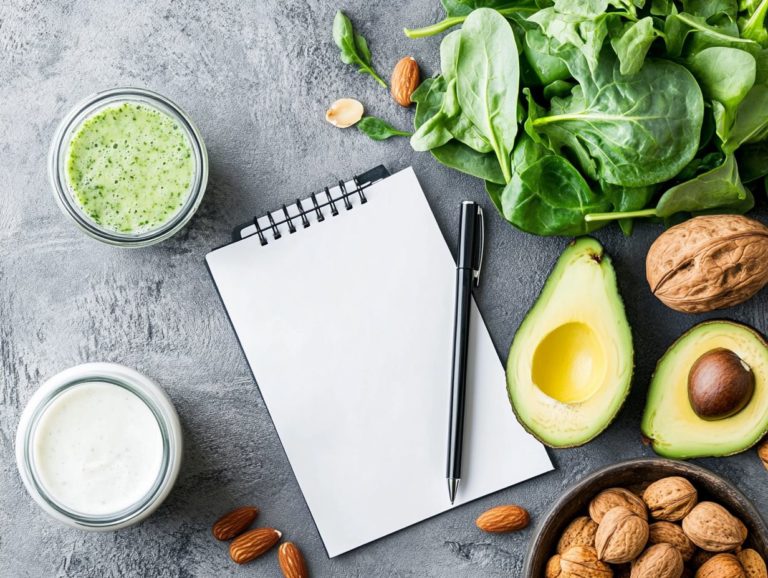Keto Diet and Skin Health: Common FAQs
Contents
- The Keto Diet and Skin Health: What You Need to Know
- Key Takeaways:
- What Is the Keto Diet?
- How Does the Keto Diet Affect Skin Health?
- What Are the Benefits of the Keto Diet for Skin Health?
- What Are the Potential Side Effects of the Keto Diet on Skin Health?
- 4. Skin Sensitivity
- How Can You Maintain Healthy Skin While on the Keto Diet?
- 1. Stay Hydrated
- 2. Eat a Variety of Nutrient-Dense Foods
- 3. Take Supplements if Needed
- 4. Practice Good Skincare Habits
- Frequently Asked Questions
- What is a keto diet and how does it affect skin health?
- Can a keto diet help with common skin issues like acne and eczema?
- Are there any potential side effects of following a keto diet for skin health?
- Can certain foods on a keto diet improve skin health more than others?
- Is it necessary to follow a strict keto diet to see improvements in skin health?
- Are there any recommended supplements to take while on a keto diet for skin health?
The Keto Diet and Skin Health: What You Need to Know
The keto diet, celebrated for its low-carb and high-fat approach, has taken the wellness world by storm, intriguing many with its potential for weight loss and other health benefits.
You might be wondering how this diet influences more than just weight management, particularly regarding your skin health. This article delves into the effects of the keto diet on various skin conditions, such as acne, eczema, psoriasis, and rosacea, and its impact on inflammation reduction and collagen production.
It also highlights the advantages it can bring to your skin, potential side effects to keep an eye on, and essential tips for maintaining a radiant complexion while embracing this dietary shift, including effective dietary changes and skincare routines.
Get ready to explore the fascinating connection between what you eat and the health of your skin, including how nutrient deficiencies and the ketosis process play a role!
Key Takeaways:
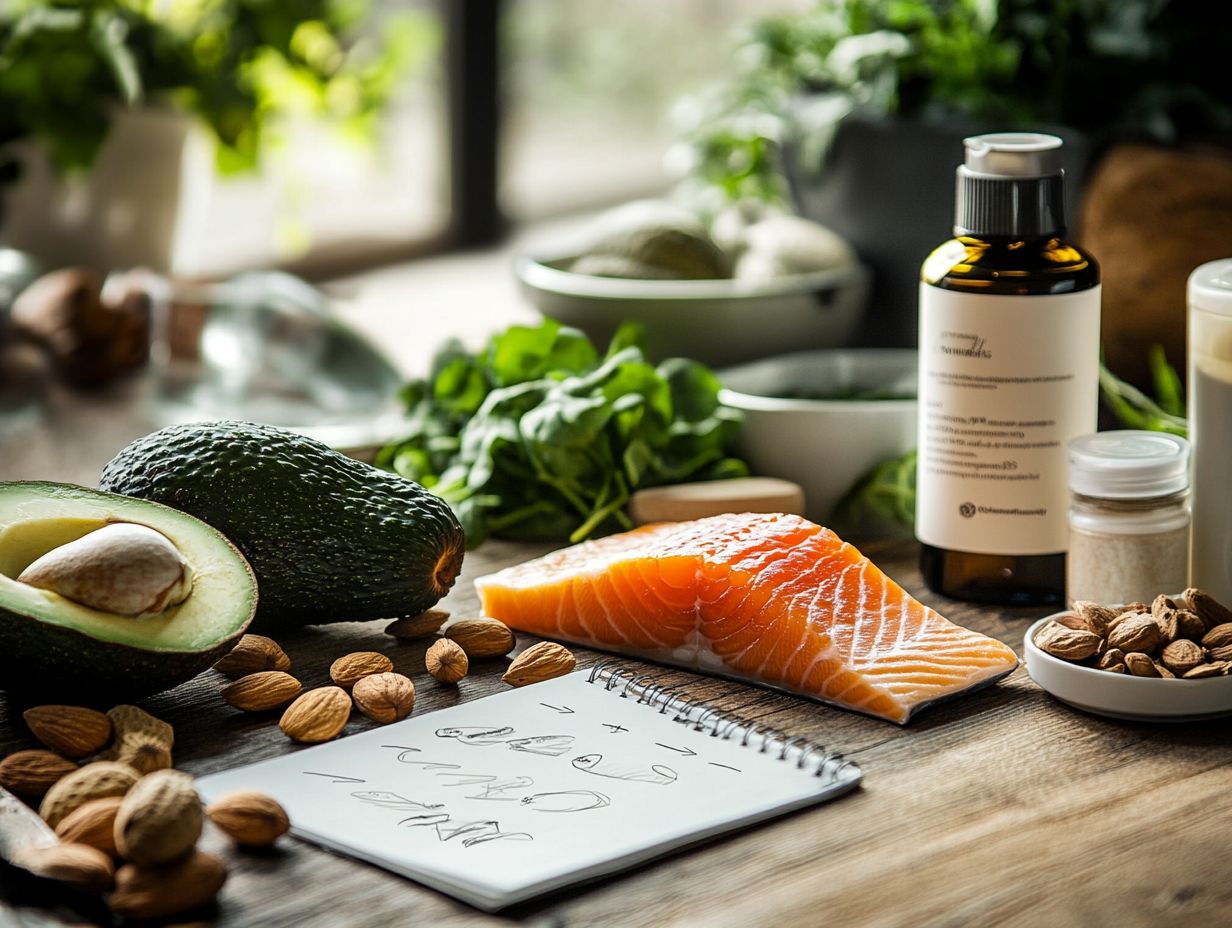
- The keto diet may have an impact on skin health, both positive and negative.
- The keto diet may reduce inflammation, balance hormones, improve gut health, and support collagen production, which can benefit skin health.
- Some potential side effects of the keto diet on skin health include keto rash, dryness, irritation, sensitivity, and prurigo pigmentosa.
What Is the Keto Diet?
The keto diet, or ketogenic diet, is a low-carb, high-fat dietary approach that aims to change how your body uses energy by shifting into a state known as ketosis. In this state, your body begins to burn fat for fuel instead of relying on carbohydrates, leading to effective weight loss and increased energy levels.
By significantly cutting back on carbs and replacing them with healthy fats, you can unlock a range of health benefits, including improved mental clarity, reduced inflammation, and a more pronounced decrease in body fat. Including healthy oils and omega-3 fatty acids is crucial for overall well-being.
How Does the Keto Diet Affect Skin Health?
The keto diet offers you more than just a pathway to weight loss; it can also work wonders for your skin health. By emphasizing anti-inflammatory foods and nourishing healthy fats, this diet can help you achieve a glowing, beautiful complexion!
As you reduce your carb intake, you naturally increase your consumption of omega-3 fatty acids and other vital nutrients that promote collagen production key for maintaining skin elasticity and minimizing acne symptoms. These dietary changes are essential for achieving optimal skin health.
Along with these dietary shifts, the anti-inflammatory properties of the ketogenic diet can lead to enhanced skin conditions and an overall boost in dermal well-being, allowing you to feel as good as you look. Consulting a dermatologist can further tailor this approach to your specific skincare needs.
Does the Keto Diet Cause Acne?
While some individuals may find themselves facing acne during the initial phase of the keto diet, the relationship between your dietary choices and skin health is quite intricate. As your body adjusts to this new way of using energy, it s not uncommon to experience temporary acne symptoms.
However, over time, the reduction of inflammation and the introduction of healthy fats generally lead to positive improvements in your skin health. It s essential to recognize how nutrient deficiencies and balancing protein intake can contribute to skin issues when following this low-carb, high-fat regimen.
As you transition away from sugar and refined carbohydrates, you might notice that the increase in certain fats can initially disrupt your skin’s balance, possibly leading to breakouts. However, the keto diet encourages the consumption of nutrient-rich food sources like avocados, nuts, and fatty fish, which can enhance your skin vitality. These foods are packed with essential fatty acids and antioxidants that aid in repair and rejuvenation, ultimately resulting in a clearer complexion. Ensuring adequate vitamin intake can further support this positive transformation.
To help ease any initial skin reactions, staying well-hydrated and considering proper supplementation can be beneficial. This approach will guide you toward a more balanced dietary pattern that not only aligns with your health goals but also promotes lasting skin wellness. Integrating a comprehensive skincare routine can also aid in maintaining skin health during this transition.
Ready to transform your skin from the inside out? Let s dive deeper into how the keto diet can work for you!
Does the Keto Diet Help with Eczema?
Many advocates of the keto diet assert that it can effectively alleviate eczema symptoms, thanks to its anti-inflammatory properties and emphasis on healthy fats. By reducing your carbohydrate intake and prioritizing nutrient-dense foods, you may find that the ketogenic diet helps minimize flare-ups and enhances your overall skin condition.
Incorporating omega-3 fatty acids and other anti-inflammatory nutrients is essential in this dietary strategy. You might be intrigued to learn that numerous individuals have reported remarkable improvements in their skin health after embracing this diet, noting a significant reduction in redness and irritation.
Research indicates that the high levels of healthy fats and the low glycemic index of the foods consumed can reduce inflammation, a common trigger for eczema outbreaks. Anecdotal evidence from those struggling with eczema underlines how adopting a ketogenic lifestyle not only assists in managing their skin condition but also fosters an enhanced sense of overall well-being, providing newfound confidence.
By concentrating on whole foods and eliminating specific triggers, many have discovered the relief they sought when conventional treatments fell short. Consulting with a dermatologist can further help tailor dietary tips to individual needs.
Does the Keto Diet Help with Psoriasis?
Psoriasis, a chronic inflammatory skin condition, may benefit from the dietary changes associated with the keto diet, which emphasizes low carb and high fat intake. By focusing on foods that reduce inflammation, the ketogenic diet can potentially help you manage psoriasis symptoms and provide relief from flare-ups.
Including healthy oils and omega-3 fatty acids can further support this dietary strategy. Incorporating healthy fats can contribute to an improved inflammatory response and enhance your overall skin health.
Fatty fish such as salmon, sardines, and mackerel are excellent sources of omega-3s that can support a more balanced immune response. Avocado and olive oil are also rich in monounsaturated fats and play a crucial role in maintaining your skin’s hydration and elasticity.
Nuts and seeds, like chia and flaxseeds, are valuable additions due to their high content of healthy fats and antioxidants, which can help combat oxidative stress.
By embracing these dietary modifications, you could notice significant improvements in your skin texture and a reduction in the frequency and severity of flare-ups, ultimately leading to a more comfortable daily life. Be sure to consult with a healthcare provider for personalized dietary advice.
Does the Keto Diet Help with Rosacea?
If you re struggling with rosacea, you could discover significant relief by embracing the keto diet, which emphasizes low carbohydrate intake and a focus on anti-inflammatory foods. By reducing sugar and gluten, you can potentially minimize the triggers that exacerbate rosacea symptoms, making the ketogenic approach a compelling choice for maintaining skin health.
Incorporating dietary changes that feature healthy fats and omega-3 fatty acids may further bolster your skin condition. By prioritizing foods like avocados, nuts, seeds, and fatty fish, you can provide your body with essential nutrients celebrated for their anti-inflammatory benefits.
These dietary adjustments not only assist in weight management but also foster an internal environment less conducive to chronic inflammation, which is a long-lasting state that can harm the body.
Adding antioxidant-rich vegetables such as spinach and kale can enhance your skin health, helping to manage the redness and irritation often linked with rosacea. Ensuring you receive adequate nutrients through these foods can also support better skin texture and overall vitality.
As you navigate your dietary choices, you may find that committing to the principles of the keto diet not only leads to improved skin but also enhances your overall sense of well-being. Consider discussing your dietary plans with a healthcare provider for personalized insights.
What Are the Benefits of the Keto Diet for Skin Health?
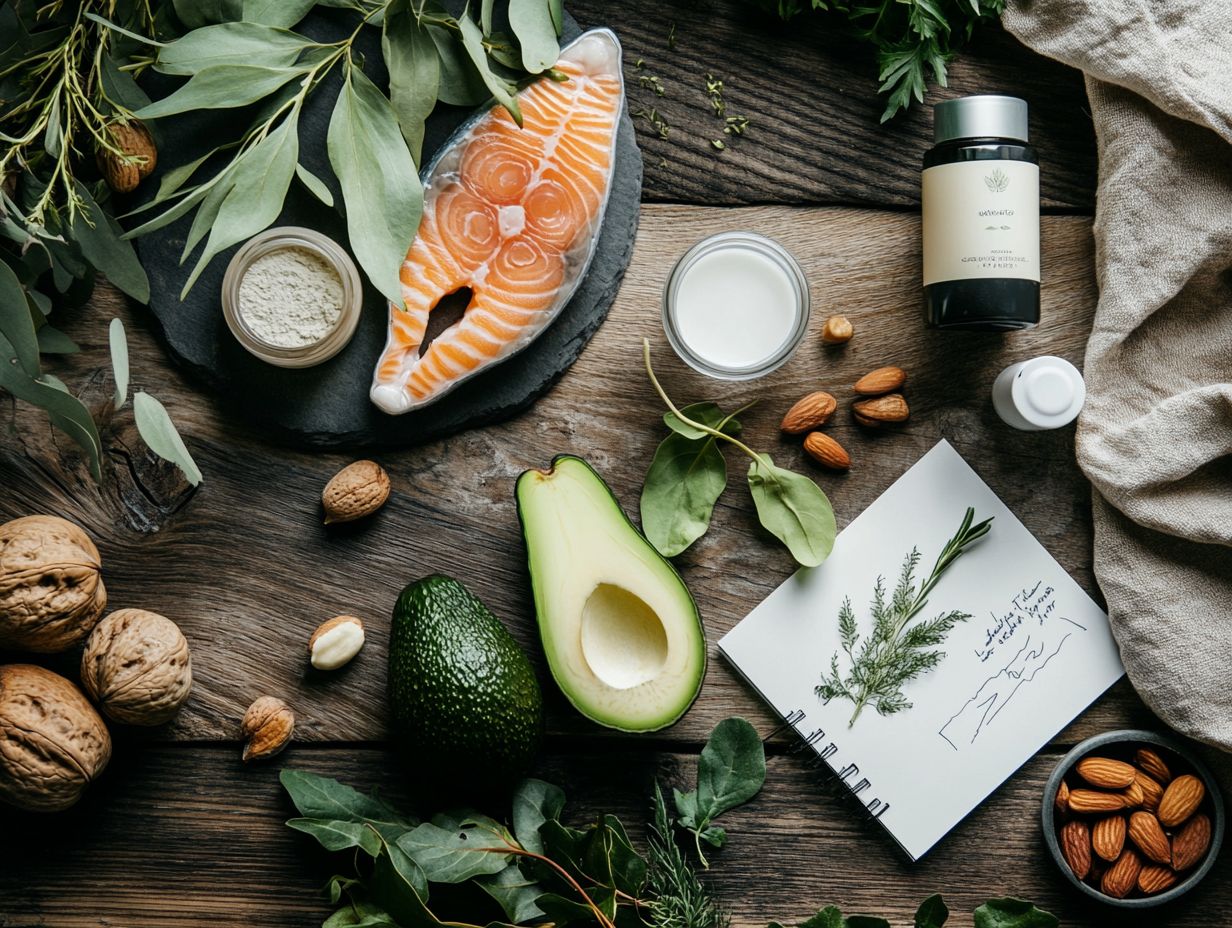
The keto diet offers amazing benefits for your skin health that you won’t want to miss! It primarily does this by reducing inflammation, balancing hormones, and enhancing gut health. By focusing on low-carb, high-fat food sources that are abundant in antioxidants, you can enjoy clearer skin, diminished acne symptoms, and an overall improved complexion. Incorporating nutrient-rich foods and proper supplements can further optimize these benefits.
Healthy fats are crucial for supporting collagen production, which is essential for maintaining youthful, radiant skin.
Benefits of Reducing Inflammation
One of the most significant benefits of the keto diet is its remarkable ability to reduce inflammation throughout your body, directly enhancing your skin health. By cutting back on inflammatory foods like processed sugars and grains the ketogenic approach creates a better environment for clear skin and minimizes the severity of conditions like acne and eczema.
This transformation primarily comes from the diet s focus on healthy fats and low-carb vegetables, which are rich in antioxidants and anti-inflammatory compounds. For instance, incorporating foods like avocados and olive oil can help combat oxidative stress, while vibrant produce such as spinach and bell peppers deliver essential vitamins and proteins that support your skin’s vitality.
In contrast, ingredients commonly found in traditional diets such as refined carbs and additives can trigger inflammatory responses that lead to frustrating skin flare-ups. By shifting to a keto diet, you can significantly reduce your intake of these harmful substances and embrace alternatives that promote better overall health while contributing to a radiant complexion.
Benefits of Balancing Hormones
Balancing hormones is another critical benefit of the keto diet, contributing to improved skin and overall well-being. The diet’s emphasis on low carbohydrates and high healthy fats helps stabilize insulin levels, reducing the likelihood of hormonal imbalances that can lead to acne and other skin issues. Essential fat intake supports hormonal equilibrium, fostering a healthier complexion and alleviating skin problems associated with hormonal fluctuations.
The ketogenic diet plays a vital role in balancing hormones, which can significantly impact your skin health and help alleviate acne symptoms. By stabilizing insulin levels and reducing insulin resistance through a low-carb, high-fat intake, the keto diet assists you in regulating the hormonal fluctuations that often contribute to skin problems. This dietary change can also support weight loss and inflammation reduction, further benefiting skin health.
This diet also helps manage other hormones, such as cortisol and estrogen. Elevated cortisol levels, frequently associated with stress, can trigger inflammation in the skin, worsening conditions like eczema or psoriasis. By promoting a steady energy source through ketosis, the keto diet may help lower your stress levels, indirectly influencing cortisol production. Regular intake of healthy fats and omega-3 fatty acids can also have anti-inflammatory effects, improving skin conditions.
Fluctuations in estrogen can lead to unwelcome skin changes, particularly during hormonal cycles. Embracing a ketogenic lifestyle can aid in normalizing estrogen levels, resulting in clearer, healthier skin. Maintaining proper nutrient intake, including vitamins and minerals, helps prevent nutrient deficiencies that could affect skin health.
These dietary adjustments cultivate an environment conducive to hormonal balance, which is crucial for maintaining a radiant complexion. Additionally, focusing on food sources rich in protein supports collagen production, further enhancing skin elasticity and appearance.
3. Improves Gut Health
Improving gut health is a significant advantage of the keto diet, profoundly influencing your skin’s appearance. A well-functioning gut is crucial for reducing inflammation and enhancing nutrient absorption, directly impacting skin clarity and overall radiance.
By embracing healthy fats and fiber-rich low-carb vegetables, the ketogenic diet nourishes you while fostering a balanced gut microbiome. The inclusion of probiotics and fermented foods further supports gut health, which can lead to improved skin conditions such as reduced acne symptoms and inflammation.
Certain foods like avocados, nuts, and leafy greens are invaluable for their nutrient density. These powerhouses supply essential fatty acids, antioxidants, and vitamins that rejuvenate your skin s moisture and elasticity. Including omega-3 fatty acids from fish or supplements can enhance skin hydration and reduce inflammation.
Incorporating probiotics and fermented foods like sauerkraut and kimchi into your low-carb lifestyle helps populate your gut with beneficial bacteria. As a result, you’ll likely see clearer skin with fewer acne outbreaks and reduced rosacea, highlighting the remarkable connection between a thriving digestive system and vibrant, healthy skin.
Regularly consuming skin-friendly foods rich in vitamins and healthy oils supports overall skin health.
4. Increases Antioxidants
The keto diet boosts the amount of antioxidants you eat, which is crucial for combating oxidative stress and maintaining a youthful glow in your skin. By emphasizing nutrient-dense foods packed with antioxidants such as leafy greens, nuts, and avocados you can enhance your skin’s resilience against environmental damage and the signs of aging.
This diet also includes a variety of antioxidant-rich foods that invigorate your skin’s vitality. Take berries, for instance. They are lower in sugar compared to other fruits, making them a powerhouse of vitamins and minerals essential for skin repair. Olives and cocoa powder, both perfectly keto-friendly, are celebrated for their high antioxidant content and anti-inflammatory benefits.
By incorporating these foods, you can support collagen production, vital for skin elasticity. Weaving these delightful foods into your meals allows you to naturally nurture your skin’s health while reaping the rewards of the ketogenic lifestyle.
Ensuring a well-balanced intake of nutrients and maintaining a consistent skincare routine can help you make the most out of the keto diet.
What Are the Potential Side Effects of the Keto Diet on Skin Health?
While the keto diet offers a wealth of benefits, it’s essential to be aware of its potential side effects on skin health. As you embark on this dietary journey, you might encounter skin-related issues such as keto rash (a skin condition that can cause red, itchy patches), dryness, irritation, and increased sensitivity as your body adjusts to the new regimen.
Consulting with a dermatologist can provide personalized dietary tips and supplements to manage these effects effectively. Being informed about these possible side effects allows you to proactively prepare for and address any skin concerns that may arise while you embrace the ketogenic lifestyle.
1. Keto Rash
Keto rash is a common side effect when starting the ketogenic diet. It manifests as itchy, red bumps on your skin.
This condition often arises as your body adjusts to the ketosis process. It typically resolves on its own as you adjust to the diet. Understanding the causes and potential treatments can empower you to manage this temporary skin issue effectively.
The onset of keto rash usually aligns with significant dietary changes. As your body transitions from burning carbohydrates for energy to utilizing fats, this shift may trigger increased ketone production and skin reactions. Symptoms can include localized redness, inflammation, and irritation often resembling eczema. Also known as Prurigo Pigmentosa, this condition highlights the skin s sensitivity to the ketosis process.
To alleviate and prevent this uncomfortable condition, experts suggest the following strategies:
- Stay hydrated
- Ensure you re getting enough electrolytes
- Maintain proper skin hygiene
- Include omega-3 fatty acids in your diet
Moisturize affected areas regularly for relief! Gradually easing into the diet can help prevent keto rash.
2. Skin Dryness
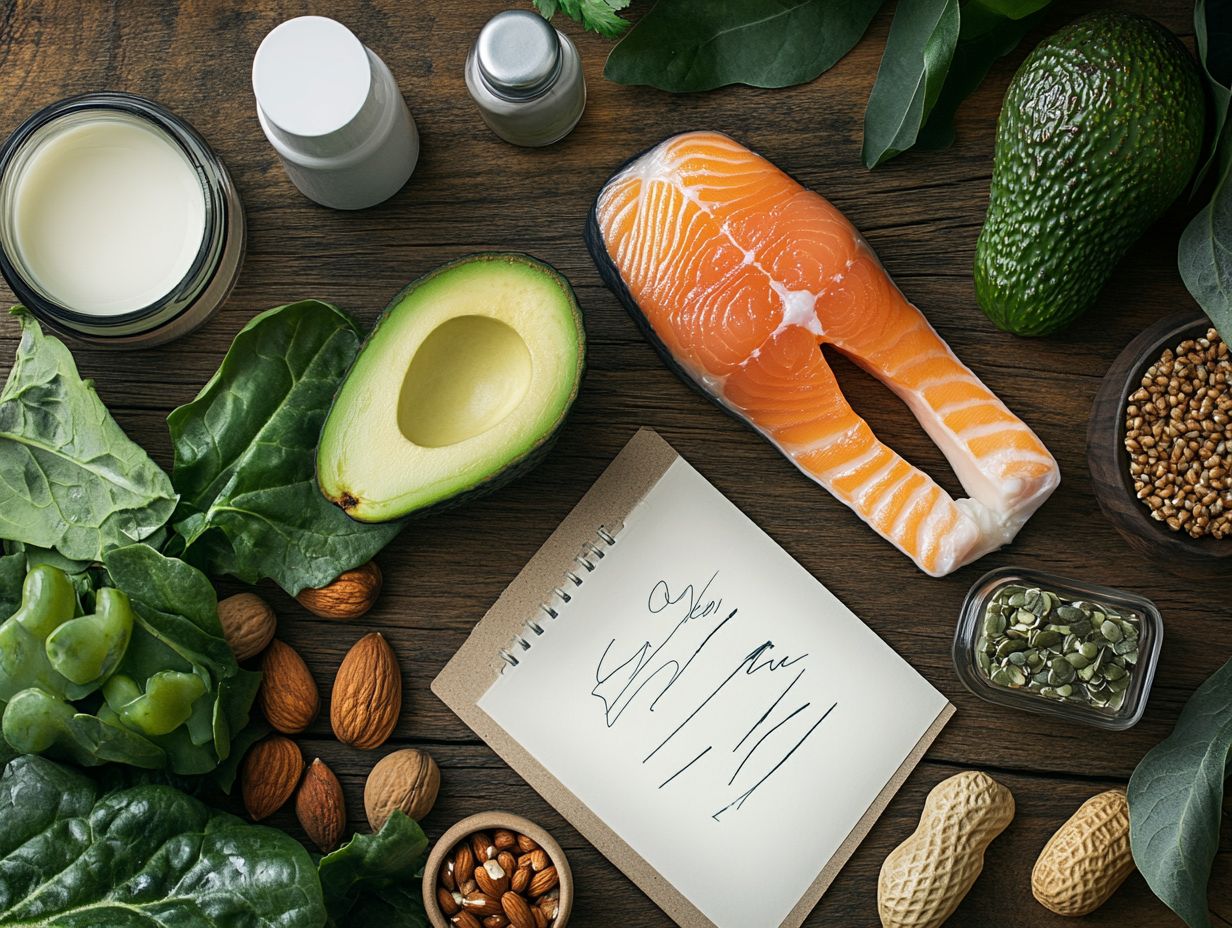
Skin dryness can become an unwelcome companion during the initial stages of the keto diet. This often results from reduced carbohydrate intake and the potential for dehydration.
To minimize this issue and promote healthy skin, it s essential to maintain proper hydration and incorporate hydrating foods into your diet.
This dryness occurs because carbohydrates play a vital role in retaining moisture within the body. When you significantly cut back on them, your skin may bear the brunt of that decision. The loss of water and electrolytes during ketosis can make skin dryness worse.
To address this concern, prioritize drinking plenty of water. Include foods rich in healthy fats and antioxidants think avocados and nuts in your meals. Establishing a daily skincare routine that features moisturizing creams and hydrating serums can work wonders! These can help replenish lost moisture and restore a luminous glow to your skin.
Dietary tips like incorporating collagen supplements can further enhance skin elasticity. Start hydrating now to keep your skin healthy and glowing!
3. Skin Irritation
You may find that some individuals experience skin irritation as a side effect of the keto diet. This is especially true when they begin to introduce new foods or supplements.
By understanding the triggers for skin irritation and making thoughtful dietary adjustments, you can alleviate discomfort and support your overall skin health.
Common culprits that can lead to skin issues during this dietary transition include a rise in processed oils, dairy, or artificial sweeteners. Some may find these irritating. Electrolyte imbalances and dehydration often side effects of the keto diet can also negatively affect skin clarity.
To counteract these issues, prioritize hydration, choose high-quality fats, and gradually introduce new foods to monitor how your skin reacts.
Incorporating skin-friendly nutrients, such as omega-3 fatty acids from fatty fish, can significantly enhance your skin health. Regularly moisturizing and maintaining a consistent skincare routine are essential practices to keep your skin resilient throughout these dietary changes.
4. Skin Sensitivity
An increase in skin sensitivity is a potential side effect of the keto diet that you may encounter. This can often lead to discomfort or reactions to certain products. Being mindful of your skincare choices and incorporating gentle, hydrating ingredients can help soothe your sensitive skin while you embrace the ketogenic lifestyle.
Using products enriched with omega-3 fatty acids and avoiding harsh chemicals can significantly reduce skin irritation. This heightened sensitivity might arise from several factors, such as dietary changes or hormonal fluctuations. It may also be due to disruptions in your skin s natural barrier.
As you adopt a low-carb regimen, it’s essential to select skincare items that are free from harsh chemicals and synthetic fragrances, as these can intensify irritation. Consulting a dermatologist for personalized advice can be beneficial during this transition.
Instead, opt for products enriched with calming agents like aloe vera, chamomile, or hyaluronic acid. Establishing a minimalistic skincare routine focused on hydration and protection can significantly support your skin’s health and resilience during this dietary transition.
Prioritizing gentle care will ensure your skin remains balanced and comfortable as you navigate your keto journey. Keeping your dietary changes gradual can also help your skin adjust more smoothly.
How Can You Maintain Healthy Skin While on the Keto Diet?
Maintaining healthy skin while following the keto diet calls for a thoughtful approach. This includes staying hydrated, indulging in nutrient-dense foods, and adhering to an effective skincare routine. Incorporating omega-3 fatty acids, healthy oils, and supplements can provide additional support for your skin health.
As your body transitions to a low-carb, high-fat regimen, supporting your skin health becomes crucial for achieving that clear, vibrant complexion you desire. Stay alert for any skin issues that may pop up so you can tackle them head-on! Actively combat potential concerns through proper hydration and nutrition. Additionally, understanding how the keto diet affects bone health can be highly beneficial, and consulting with a dermatologist for personalized advice is also recommended.
1. Stay Hydrated
Staying hydrated is essential for maintaining healthy skin, especially when you’re on the keto diet. Dehydration can worsen skin dryness and irritation. Therefore, it’s vital to drink enough water and consume hydrating foods to support your skin health.
Incorporating dietary tips such as using hydrating serums and moisturizing creams can further enhance skin hydration. This becomes particularly crucial on the ketogenic diet, as reducing carbohydrate intake often leads to increased water loss.
With your body’s stored energy running low, you need to stay vigilant. Aim to drink water throughout the day keeping a reusable bottle by your side serves as a perfect reminder. Staying hydrated also supports your overall skin health and can help alleviate potential acne symptoms caused by dietary changes.
Incorporating water-rich foods like cucumbers, lettuce, and avocados into your meals can significantly boost your hydration levels. Experimenting with infused waters think refreshing slices of lemon or vibrant berries can make the hydration process enjoyable. These food sources are also rich in vitamins and minerals essential for healthy skin.
2. Eat a Variety of Nutrient-Dense Foods
Incorporating a diverse array of nutrient-dense foods is essential for promoting your skin health while navigating the keto diet. By emphasizing healthy fats, vitamins, and minerals, you can effectively reduce inflammation and support your skin s overall vitality.
This also helps in collagen production, which is crucial for maintaining skin elasticity and reducing signs of aging. A well-rounded approach to your food choices can significantly enhance the benefits of your diet.
For instance, avocados and olive oil are not just delicious; they are excellent sources of healthy fats that provide omega-3s to nourish your skin. Leafy greens like spinach and kale fit seamlessly into your keto plan while delivering vital antioxidants that combat oxidative stress and boost your skin’s resilience.
Don’t forget to include other healthy oils like coconut oil, which can also support skin health. Fatty fish, such as salmon, are rich in protein and essential fatty acids, supporting cellular repair and moisture retention.
By integrating these foods into your daily meals, you’ll not only support your skin but also enhance your overall health on your keto journey. For those new to this lifestyle, it can be helpful to explore the keto diet for beginners: common FAQs. These foods have effects that reduce inflammation, making them excellent for reducing skin irritation and supporting overall well-being.
3. Take Supplements if Needed
Taking supplements can be a game-changer for you on the keto diet, helping to fill in any nutrient gaps that may come from cutting back on carbohydrates. By incorporating vitamins, minerals, and omega-3 fatty acids, you can enhance your skin health and overall well-being.
Supplements can also help alleviate symptoms like fatigue and nutrient deficiencies that might arise from the ketosis process. This becomes especially important, as the restrictive nature of the keto diet can lead to a shortfall of essential nutrients like magnesium, zinc, and certain B vitamins, all of which are vital for maintaining that radiant complexion you desire.
Omega-3 fatty acids, which you can find in fish oil supplements, are excellent for reducing inflammation and keeping your skin hydrated. You might also want to explore vitamin E and collagen supplements, both renowned for their ability to promote skin elasticity and combat the signs of aging.
Consulting a dermatologist can also provide personalized advice on the best supplements for your skin type. By prioritizing these supplements, you not only support your skin health but also boost your energy levels, making your keto lifestyle even more sustainable and enjoyable.
This overall approach helps in reducing acne symptoms and other skin issues related to dietary changes.
4. Practice Good Skincare Habits
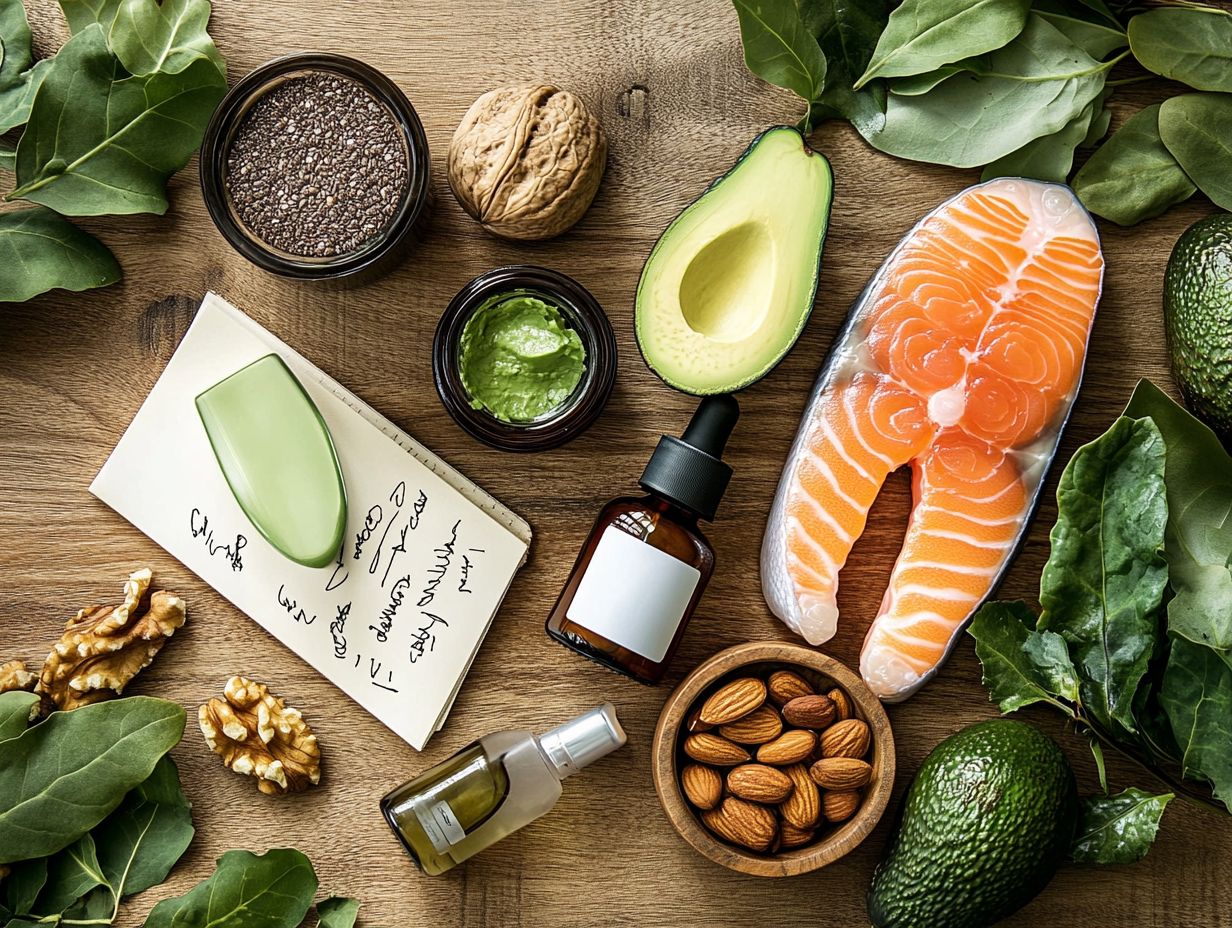
Good skincare habits are a must for glowing skin! Practicing these habits is essential for maintaining your skin’s health while navigating the ketogenic diet, especially to counteract potential side effects like dryness and irritation.
By prioritizing hydration and selecting gentle, nourishing products, you can significantly support your skin’s integrity and appearance. Establishing a proper skincare routine is crucial for long-term skin health.
As someone embracing a keto lifestyle, consider establishing a solid skincare routine that incorporates moisture-rich cleansers and hydrating serums, along with regular exfoliation to encourage cell turnover.
Opting for products that contain powerhouse ingredients like hyaluronic acid and ceramides will enhance your skin s moisture retention, creating a protective barrier against environmental stressors. This routine may also help reduce symptoms of prurigo pigmentosa, a rare condition sometimes associated with low-carb diets.
It’s also crucial to apply a broad-spectrum sunscreen daily, as certain aspects of the diet may render your skin more sensitive to the sun’s rays. A well-rounded skincare regimen that emphasizes hydration will not only help alleviate dryness but also contribute to a radiant, glowing complexion.
Incorporating dietary tips like consuming sufficient electrolytes can support your skin’s health from within.
Frequently Asked Questions
What is a keto diet and how does it affect skin health?
A keto diet is a low-carb, high-fat diet that aims to put the body in a state of ketosis, where it burns fat for energy instead of glucose. This diet can also help you lose weight and maintain healthy body fat. The keto diet can improve skin health by reducing inflammation and balancing hormones.
Can a keto diet help with common skin issues like acne and eczema?
Yes, research has shown that a keto diet can help improve acne and eczema by reducing inflammation and balancing hormones. The ketogenic diet helps reduce inflammation, which is beneficial for these conditions. However, results may vary for each individual.
Are there any potential side effects of following a keto diet for skin health?
While a keto diet is generally safe for most people, some may experience temporary side effects such as fatigue, headaches, or constipation. Be sure to consult a healthcare professional before starting; your skin will thank you for it! Monitoring potential nutrient deficiencies is crucial for maintaining good skin health.
Can certain foods on a keto diet improve skin health more than others?
Yes, foods rich in healthy fats and antioxidants, such as avocados, fatty fish, and leafy greens, can have a positive impact on skin health. Stay hydrated and ensure you get enough electrolytes to keep your body functioning well on a keto diet. These foods also support collagen production, which is essential for skin elasticity.
Is it necessary to follow a strict keto diet to see improvements in skin health?
Not necessarily. While strict adherence to a keto diet may yield faster results, simply reducing carbohydrate intake and increasing healthy fat consumption can still have a positive impact on skin health. Even moderate dietary changes can lead to noticeable improvements.
Are there any recommended supplements to take while on a keto diet for skin health?
Yes, supplements such as omega-3 fatty acids, collagen, and probiotics may help support skin health while on a keto diet. However, it’s important to consult with a healthcare professional before adding any new supplements to your diet. These supplements also support hair health and can alleviate common keto-related issues like dryness or irritation.




